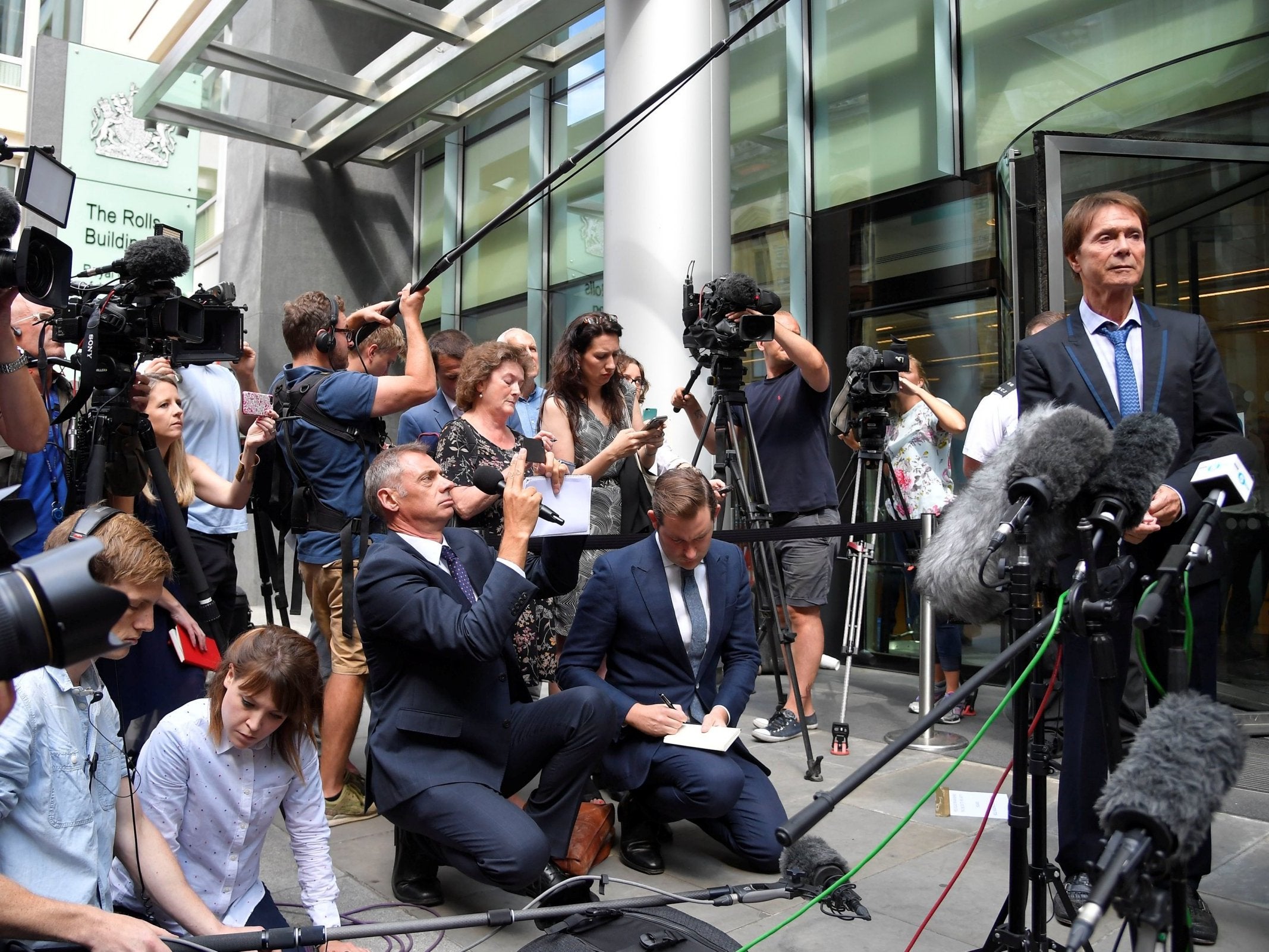Cliff Richard privacy win over BBC means media will need to 'walk on eggshells', lawyers warn
‘This impacts not just the BBC, but every media organisation. This isn’t just about reporting on individuals. It means police investigations, and searches of people’s homes, could go unreported and unscrutinised’

Cliff Richard’s victory over the BBC in a privacy dispute will mean the media having to “walk on eggshells” when covering police investigations, lawyers have warned.
The 77-year-old pop star took legal action against the corporation after it broadcast footage of South Yorkshire Police (SYP) searching his house in Berkshire, following a child sexual assault allegation.
Sir Cliff denied the allegation and was never arrested. In June 2016 prosecutors announced he would face no charges.
During a trial earlier this year, Sir Cliff told the judge that the BBC coverage, which involved the use of a helicopter, was a “very serious invasion” of his privacy.
In what was hailed a “landmark ruling”, the judge said the corporation infringed the star’s privacy rights in a “serious and sensationalist way” and awarded him £210,000 in damages.
Experts said the judgment could prevent news outlets from naming suspects before they were charged – a prospect that received a mixed response.
Legal experts who represented claimants in privacy cases welcomed the ruling, saying it provided much-needed protections for innocent people accused of crimes.
But other specialist lawyers argued the ruling risked undermining the ability of the press to cover police investigations.
Nicola Cain, a partner at corporate law firm Reynolds Porter Chamberlain, said: “This is a landmark judgment in many ways – all of which are bad for the media. The media is going to have to walk on eggshells when reporting on police investigations from now on.
“The judge found that even if an investigation involves public activity and reporting on it is in the public interest, an individual can still have a reasonable expectation of privacy in not being identified.”
She said the ruling contradicted previous decisions ”which recognised the importance to the media of identifying individuals in coverage”.
The BBC has said it is considering appealing against the ruling, arguing it is not “compatible with liberty and press freedoms”.
The corporation said in a statement: “This impacts not just the BBC, but every media organisation. This isn’t just about reporting on individuals. It means police investigations, and searches of people’s homes, could go unreported and unscrutinised. It will make it harder to scrutinise the conduct of the police and we fear it will undermine the wider principle of the public’s right to know. It will put decision making in the hands of the police.”
Dr Paul Wragg, associate professor of media law at the University of Leeds, said the court’s decision was “wrong”.
He said: “This case was brought against both SYP and the BBC. In the court’s view, the fact that Cliff Richard enjoyed a reasonable expectation of privacy against SYP meant that he could claim the same against the BBC. This is not correct. SYP has an absolute obligation to uphold human rights. The BBC does not, at least not in the same way. So the expectation against the BBC is weaker than as against SYP. The judgment does not reflect this, and the omission is a serious error.
“Clearly, SYP has no obligation to broadcast news – the BBC does.”
He added: “The court was also wrong to decide that there was no public interest in broadcasting SYP’s execution of a search warrant. The examination of police methods of executing a search warrant is in the public interest and is the proper subject of investigative journalism. The fact that the subject of this inquiry was famous clearly appealed to the BBC, but that does not eliminate the public interest at stake.”
But Nick McAleenan, a partner at Manchester-based firm JMW solicitors, told The Independent: “It was fairly obvious that filming the police going into someone’s house was going to be intrusive. Reporting on it in that way was a legally risky thing to have done.”
He welcomed the ruling, saying it helped clarify a “grey area” of the privacy rights of suspects. “I do think it’s going to make reporting pre-arrest difficult – they’re going to have to think twice about it,” he said. “You have to put yourself in the position of the person affected. The damages reflect that.”
Sir Cliff looked visibly shaken outside the court following the ruling. He said: “I can’t really answer too many questions at the moment. It’s going to take me a while to get over the whole emotional factor and so I hope you will forgive me.”
Jon Oakley, of Simkins law firm, which represented Sir Cliff, said: “The BBC has suggested that this judgment means it is a dark day for press freedom. That’s simply not correct. Where there is a genuine public interest in people being named – for example, where there is imminent risk or danger to the public – the press rightly continues to be free to identify the person being investigated.
“However, after very careful consideration, the judge found that any such public interest does not exist on the facts of this particular case. Therefore, rather than heralding any change in the law, we believe what this case represents is confirmation of what has already been the legal position for some time.”
Join our commenting forum
Join thought-provoking conversations, follow other Independent readers and see their replies
Comments
Bookmark popover
Removed from bookmarks